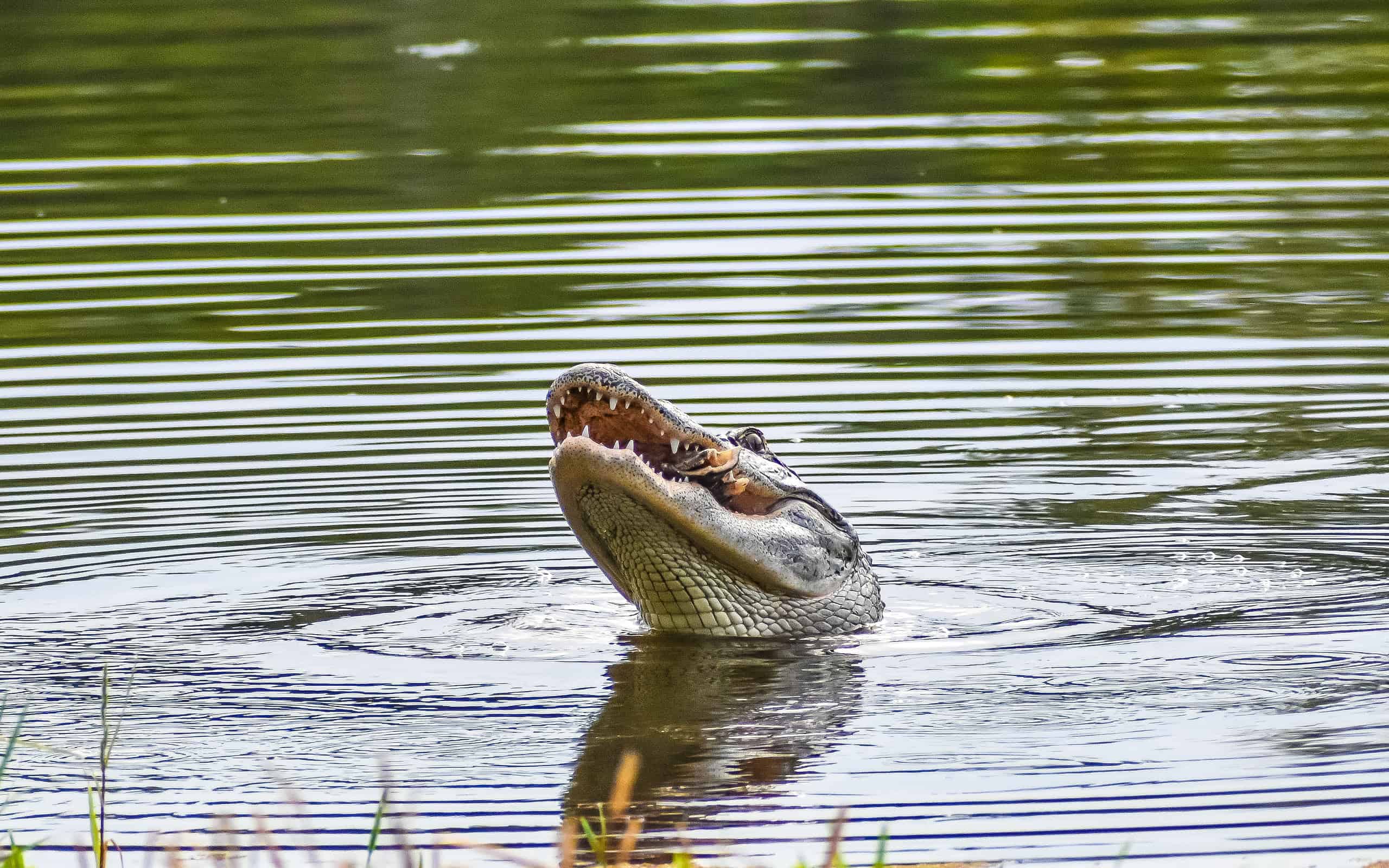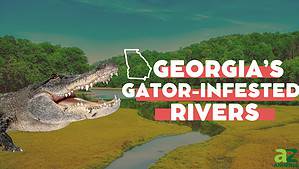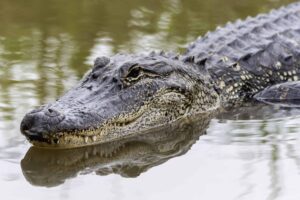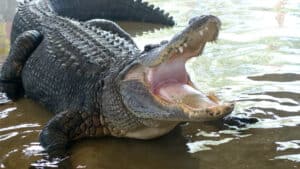When you go alligator hunting in Mississippi, the rules may be a little different for you than what you’re used to with other hunting. There are some very specific rules, and the hunting season is divided into two categories.
Since it’s up to the hunter to ensure that they’re in the right place at any given time and following the rules, it’s important that you study up and know what you’re doing before you get into the hunt. This article has you covered with most of the general information you need to catch a big gator.
Alligator Hunting Season
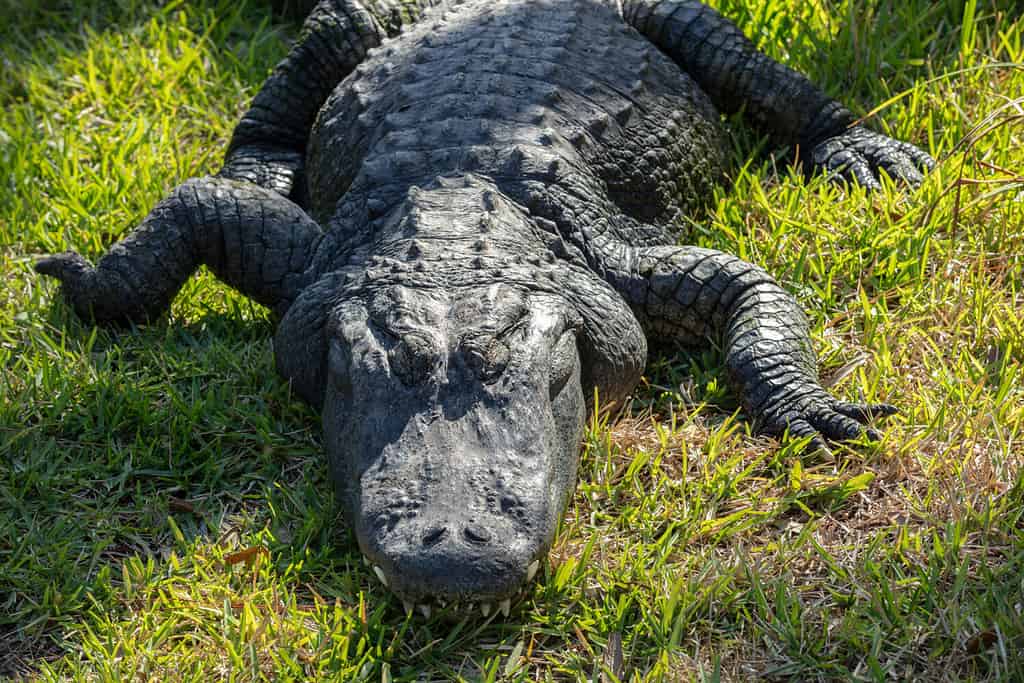
Gators can get quite big and are plenty powerful, so it’s important to make sure that you are ready before you go alligator hunting in Mississippi.
©J.A. Dunbar/Shutterstock.com
There are sort of two different hunting periods in Mississippi for alligators, but they run at the same time. One just extends longer than the other. These two hunting periods are for private land and public land.
Private Lands
The private land hunting season is the longest of the two. It goes from noon on August 25 to 6 a.m. on September 18. The dates may change per year, but this is the general time frame. Basically, for any given year, it starts on the last Friday of August and goes for 24 days after that.
Public Waters
For public waters, the hunting season starts on the same day and time as the private. However, it only goes for 10 days. In 2023, this meant it ran from noon on August 25 to noon on September 4.
Private Water Guidelines
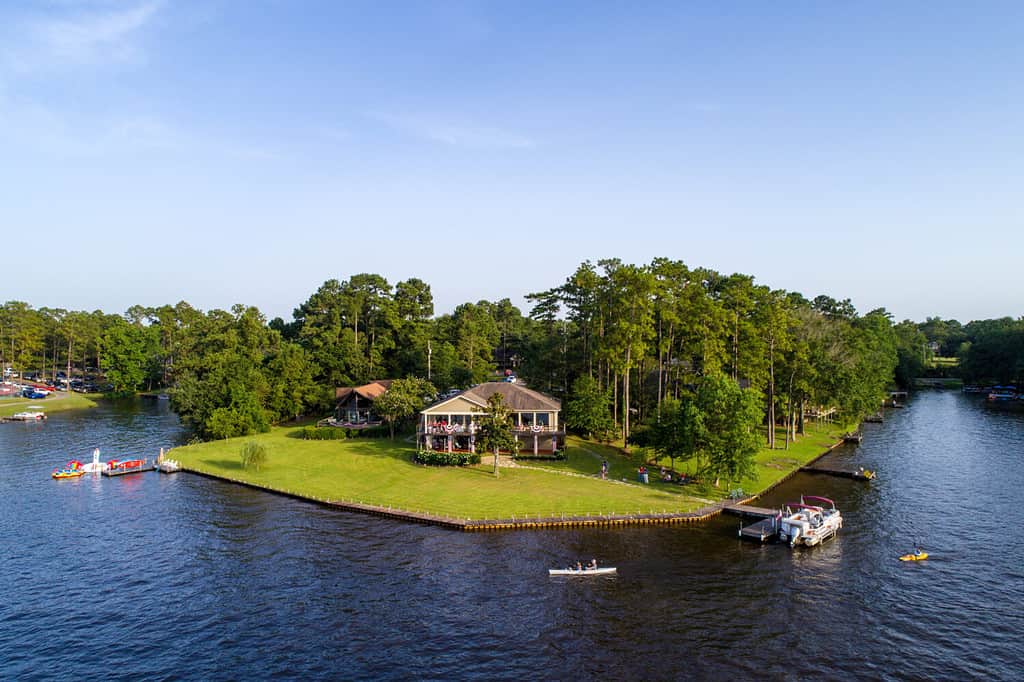
If you own some water rights for your house along a lake or river, you may be able to hunt directly on your own property.
©George Dodd III/Shutterstock.com
Private water guidelines are fairly specific. It’s important you take the time to understand all of the rules before you start hunting.
Hunting Zones
Private water hunting only applies in certain counties. It has to be on private land, either yours or someone who agrees to let you hunt on their land. The counties that allow private gator hunting in Mississippi are:
- Adams
- Attala
- Bolivar
- Carroll
- Coahoma
- Claiborne
- Copiah
- Grenada
- Hancock
- Harrison
- Hinds
- Holmes
- Humphreys
- Issaquena
- Jackson
- Jefferson
- Lawrence
- Leake
- Leflore
- Lowndes
- Madison
- Marion
- Neshoba
- Noxubee
- Oktibbeha
- Pearl
- River
- Rankin
- Sharkey
- Simpson
- Sunflower
- Tallahatchie,
- Warren
- Washington
- Wilkinson
- Winston
- Yazoo
If you, or the property you want to hunt on is in one of these counties, you are allowed to apply for a private waters alligator hunting tag.
When to Apply for Tags
To apply for tags, you will want to apply between May and July. The applications tend to be open for two months, running from May 1 to July 1. The deadline is July 1. If you mailed in your application, the document has to be received by the 1st of July for it to count. So it’s best to send them in early. There is no application fee for private land alligator hunting in Mississippi.
You are allowed to apply for any private property in one of the counties listed above as long as the landowner has signed your paperwork and the land has at least 20 acres of permanent surface water included in the private land.
Only one application per private property is allowed, no matter the size of the land and water. For any extra 100 acres of water you own, you may get an additional hunting tag. On private lands, the hunting permit is $100 for residents and $200 for non-residents.
Public Water Guidelines

Alligator hunting in Mississippi can take you to some pretty interesting places.
©Malachi Jacobs/Shutterstock.com
Both public water and private water alligator hunting in Georgia have slightly different rules. The rules for public water hunting are listed below.
It’s also important that you stay away from the state borders. It’s up to the hunter to ensure that they are still within the Mississippi state borders at all times of the hunt.
The Mississippi government offers a helpful map that shows you public waterways, rivers, and bodies of water to assist any hunters unsure about where they’re allowed to hunt.
Hunting Zones
There are several different hunting zones throughout the state. Instead of being broken up by county, they are broken up by direction. There are a total of seven zones. Like many states, each zone gets a select number of permits based on the gators in the area.
Some zones have additional rules or guidelines, so it’s a good idea to look around for information on the zone you will be hunting in to ensure that you’re following all the rules.
Northwest
The northwest zone usually has around 40 permits given out in the year. This is the zone with the lowest permits by far. The northwest zone stretches to the top and most western part of the state. It goes east until it hits Interstate 55 and it goes south until it reaches Highway 82.
Northeast
Northeast tends to have 130 permits or so given out a year. This is another fairly low amount and is usually the zone with the third lowest number of permits on average.
This low number is even more apparent when you realize how big the zone is. It reaches the most northern and eastern parts of the state. The zone also goes west until it reaches Interstate 55. Then, the zone stretches south until it reaches Interstate 20.
West Central
The west central zone tends to have a lot more permits. They offer around 190, which ties it for first place. The west central zone is a small zone that is enclosed between Highway 82, Interstate 20, and Interstate 55.
Southwest
Southwest is another heavily populated zone. It also offers around 190 permits a year. This zone goes from the western part of the state over to Interstate 55. It also starts at the most southern part of the state west of Interstate 55 and goes up until it reaches Interstate 20.
South Central
The south-central zone offers around 150 permits a year. This zone is wedged between Highway 49, Interstate 55, and Interstate 20. It reaches all the way down to the coast.
Southeast
The southeast zone offers 160 or so permits. It goes from the southernmost part of the state near the ocean up to Interstate 20 and goes west until it reaches Highway 49.
Pearl River/ Ross Barnett
The zone that offers the second-lowest permits a year is the Pearl River/Ross Barnett zone. It’s still a big jump from the northwest as it offers 100 permits or so a year.
This zone is technically inside of the northeast zone. It’s in the lower west corner right on the border of two zones. It doesn’t take up much space at all.
When to Apply For Tags
When you apply for tags for public water hunting is a little different from private hunting as well. It’s a short window, only going for eight days. It occurs on the first week of June, usually running from June 1st to June 8th. It opens at 10 a.m. on the first day and goes until 10 a.m. on the last day.
It’s important to note that in Mississippi, you only get the choice of one zone. Unlike many other states, you don’t get a few options to choose from. Instead, you pick your preferred zone. If your name is chosen after the zone is full, you will not be able to get a tag that year. And if you are chosen, you can only hunt in the zone you picked.
Cost
When you apply, you do have to pay a fee, whether or not you get the permit. The application fee changes, but tends to stay between $2 and $3.
When Is Drawing?
For alligator hunting in Mississippi, drawing occurs around June 14. A certain number of people will be drawn. If their zone is still open when their name is drawn, they will be informed that they’ve gotten a permit and will be prompted to purchase.
If, at the end of the drawing, there are still zones that have permits, another drawing will occur. Sometimes, permits may not be filled because people don’t buy the actual permits in time, or too many people picked one zone, and other zones weren’t filled.
When these situations occur, another drawing will occur to fill any open permits that weren’t filled from the first. It draws on the 22nd. It will only be for zones where permits weren’t filled.
Once the second drawing is over, those picked will get a text or email. They then have 48 hours to purchase the permit.
Permits
For a permit, you have to pay an additional $200. After the purchase goes through, you will receive your tags, permit, and alligator hunting license in roughly two weeks. There’s often a deadline, so if you don’t get your items in the mail by then, you can contact the Department of Wildlife and they will work with you to get you replacements.
General Guidelines for Alligator Hunting in Mississippi
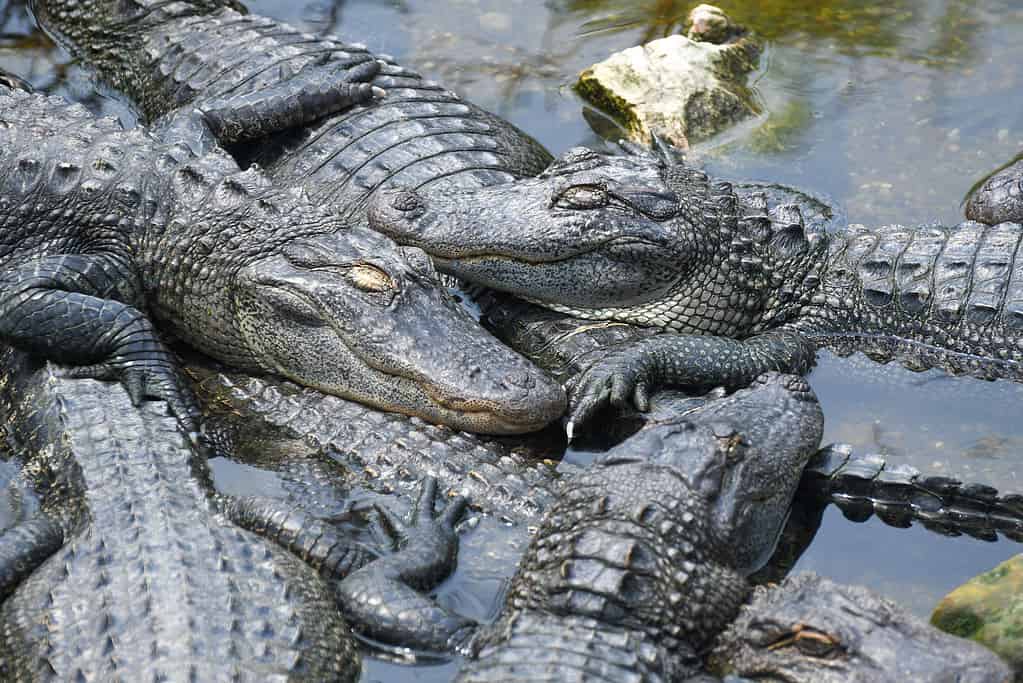
There are some general guidelines that every hunter has to follow, whether they are hunting on private or public lands.
©Chris Drahos/iStock via Getty Images
There are some general guidelines that every hunter has to follow, whether they are hunting on private or public lands. For one, you are not allowed to refund or transfer any of your applications or tags. All sales are final.
You also need an active email and phone number so that you can get important notifications and updates sent to you.
For anyone applying, you have to be at least 16 years old on the date you’re applying.
Additionally, you also have to have an alligator hunting license. They cost $25 and you need one before you can purchase the Alligator Possession Permit. You also need one other license. There are several options to choose from:
- Sportsman
- All Game H/F
- Small Game H/F
- Apprentice sportsman
- Apprentice All Game
- Apprentice Small Game
- Senior Exempt
- Disabled Exempt
- Lifetime License (if you have one of these, you don’t have to purchase the alligator hunting license)
Finally, even experienced hunters have to attend hunter education. There are some workarounds, however. If you’ve been previously certified in hunter education and can’t attend a course before the hunt, you can purchase an apprentice license. These are available as a one-time purchase for hunters. It works for those who can’t attend a course, or for those who have never been certified in hunter education. It’s only valid for one year, however.
Seniors have the chance to get a permit for much cheaper, usually five dollars or so by purchasing a senior-exempt lifetime license. There is no need for anyone under 16 to get a license.
When to Get CITES Tags
After you catch and dispatch a gator, you will record your hunt information and send it to the Mississippi Department of Wildlife, Fisheries, and Parks (MDWFP). Then, after they record the information, they will send you the CITES tag. This tag must stay on the skin of the gator permanently. It needs to go near the tail, within six inches of the tip of the tail.
Recording Your Hunt Information
Once you kill an alligator, you have a few steps you have to take. First, you need to get all the relevant information for the animal. This information includes the length, girth of the belly, girth of the tail, and weight. All the lengths will be in inches. The total length can be in feet and inches. The weight is in pounds.
When you go alligator hunting in Mississippi, it’s up to you to get the weight of your gator. You can’t just use any scale either. You will have to find an area near you that has certified scales for alligator weighing. However, you don’t always need the weight. It’s only necessary if your gator may be a record-breaker.
If the MDWFP decides that your gator may be a record-breaker, you will have to meet with someone in the department, so that official measurements can be taken.
After Reporting
Once you report your information, you get sent your CITES tag. If you want the tag right away, you can go in person to one of the regional offices. Once you get this tag, you’re allowed to sell the gator if that is what you wish. CITES tags are always required, no matter which state or person you are selling to. So if you are trying to sell a gator skin and they don’t require the tag, this is a sign that they aren’t a reputable buyer.
There used to be report cards that had to be sent to the MDWFP. While these report cards are still handed out for private land hunts, they are now for your own personal records and you don’t have to turn them in. For public water hunts, an online report is required. Everyone that was permitted must fill out this form, even if they didn’t end up hunting.
Hunting
During the daylight hours, it’s possible to hunt gators from a distance. While shooting at a submerged alligator is highly discouraged, it is possible to do so. You must be aware of the possible dangers such as ricochets and potential people in the way. This method is only allowed on private lands. In public waters, you cannot discharge across the water for any reason.
During the nighttime, which is considered to be a half hour after sunset until a half hour before sunrise, you are not allowed to shoot from a distance. Instead, the alligator must be caught and restrained before you shoot it. It is illegal to kill a gator that isn’t restrained during the night.
Restraining an alligator requires a snare around the neck or leg. You can use handheld snares, snatch hooks, harpoons, and bow fishing equipment. Immediately after capturing an alligator, it must be discharged.
No weapons may be discharged within 100 yards of any building or structure, including boat ramps and campsites.
Weapons for Alligator Hunting in Mississippi
When it comes to dispatching a gator, only long-barreled shotguns are allowed. They must be a #6 shot or smaller, such as a 7, 7.5,8, or 9. You can also use a bang-stick in a .38 caliber or larger. No handguns or pistols loaded with shotgun shells are allowed.
No alligator is allowed to be shot until it is restrained by a noose or snare around the neck at night in private lands. In public lands, the gator must be restrained at all times. Generally, the best time to shoot it is when it stops thrashing after tugging on the restraining line.
The best place to shoot for a humane kill and a good hide is right behind the skull plate. Shooting through the skull plate may cause a bullet to ricochet as it’s very dense.
If you miss the shot, you may temporarily stun or knock out your gator. For this reason, you never want to transport an alligator until its mouth is fully taped shut.
Putting Your Catch Into a Boat
With most gators, you want to haul it into the boat. However, some may be too large. In these cases, you want to use your restraining noose to pull the alligator behind the boat and onto the bank slowly. Then, you can put the gator into the boat after securing both the mouth and legs.
To secure the mouth, you secure the mouth with several wraps of duct tape or electrical tape. Some people also use make-shift rubber bands by cutting cross sections from a tire or inner tube.
For the legs, you take a high-quality rope and wrap the two front legs together and two back legs together. You don’t want to use twine or string as they can cut into the wide. These ropes also assist in giving you leverage to haul the alligator back into the boat.
Alligator Hunting in Mississippi Exceptions
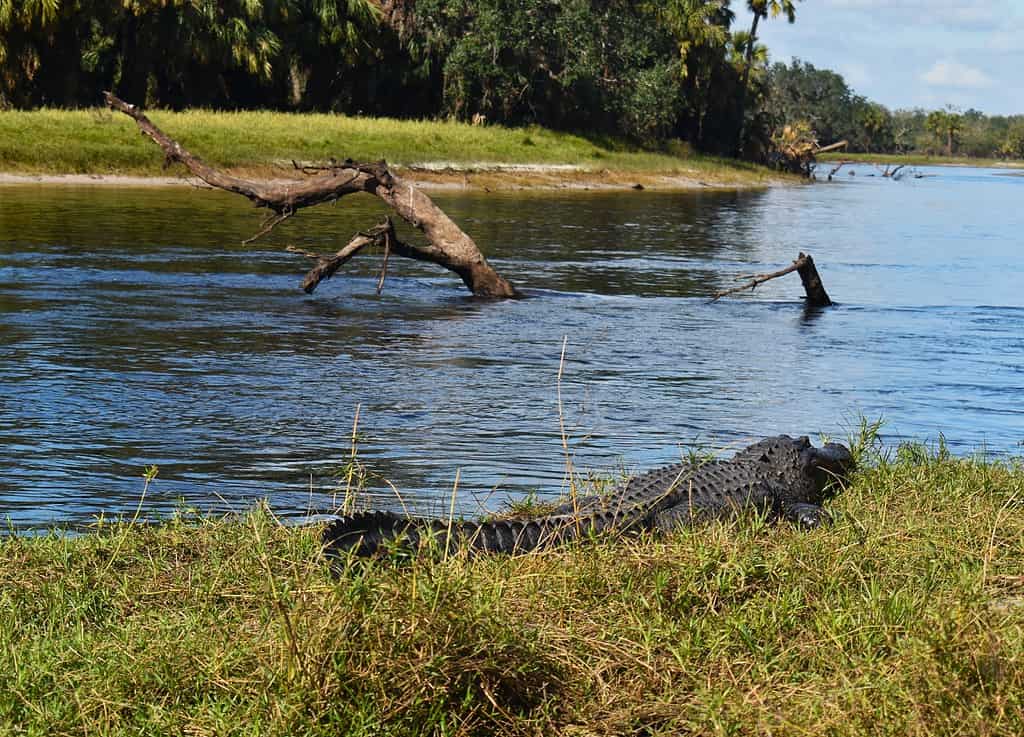
Be careful, alligators won’t always be in the water.
©SuJo Studios/Shutterstock.com
Occasionally, if hunting in an area gets bad, the Mississippi Department of Wildlife will change the rules. Such was the case in May of 2023. Enough people had complained about the number of gators in Pelahatchie Bay that the department realized that something had to be done.
They created a temporary hunting season that ran from the 5th to the 7th, and then the 12th to the 14th. They ran a lottery to allow 24 hunters to go and collect two gators over six feet long during the two weekends.
The department opened the hunting during the cooler season in order to try and target mostly females. By targeting females, they will manage to not only reduce the population but to slow down further breeding.
To keep the hunt safe, alligators aren’t allowed to be killed within 100 yards of any structures. The alligators must be killed at point-blank range after being secured as well for further safety.
Thank you for reading! Have some feedback for us? Contact the AZ Animals editorial team.

